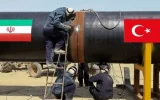Türkiye has overtaken Iran’s gas; We continue to engage in energy imbalances

According to Energy Press, the imbalance situation is so complicated that the 7th development plan was written with a focus on solving the energy imbalance crisis, and there is no mention of development in it, which means that the next government will be able to provide water, electricity, gas, and gasoline to the people. , a lot of time should be spent, and in this situation, development may be a more medium-term goal.
At the same time that the 14th government should spend on solving the crisis of disagreements, the neighboring countries are rapidly developing infrastructure and taking regional markets, especially in gas and electricity. Before the speed of Qatar’s investment in the common gas field of South Pars, the concern of losing common resources Qatar was talking about taking the LNG markets, and now Turkey has become a competitor in terms of swap despite the fact that it has neither oil nor gas resources.
Everything is available for Turks
In a related report, Oil Price writes: Turkey has announced in its latest gas program that it is ready to significantly increase the export of natural gas to the European Union. For this purpose, the most likely route is the re-export of gas from the Republic of Azerbaijan from Turkey. This, in turn, requires Turkey to import more from Russia to make up for gas shortages, and indeed Ankara is willing to play the savior role and strengthen its influence vis-à-vis Brussels, which is the role it was once intended to play. Iran should play a role, at a time when Iran had a lot of gas resources in production and surplus, and had defined its goal of becoming a center in the field of gas exports in the region and further to Europe.
In the meantime, Europe has been trying to replace Russian gas transiting from Ukraine with other sources for the past few years. In 2019, Russia and Ukraine signed a five-year pipeline transit agreement to send Russian natural gas to EU countries. Both countries have stuck to the agreement despite the war and sanctions, but that could soon change as Ukraine has announced it will not renew it after it expires at the end of 2024. The European Union does not want to revive this agreement.
The Republic of Azerbaijan is the key to any Turkish plan to increase gas exports to the European Union. Azerbaijan’s natural gas, which is sold to Turkey, can be re-exported to Europe through Bulgaria, but not without effort and cost. In an interview with Bloomberg, Turkey’s Energy Minister Alp Arslan Bayraktar showed a preference for Bulgaria’s path, pointing to the potential to increase the volume of exports to the EU to 10 billion cubic meters per year, while at the same time sending a clear message to Brussels that without Some demand guarantees, this will not happen. According to Bayraktar, the export capacity through Bulgaria is currently only about 3.5 billion cubic meters per year, but from a technical point of view, Turkey can strengthen this connection point.
The Turkish energy minister has said that what we need is an increase in the connection capacity between Turkey and Bulgaria, which currently can only receive about half of the seven billion cubic meters per year that Turkey can technically supply.
In 2023, Turkey and Bulgaria signed an agreement that allows the Bulgarian state company Bulgargaz to import 1.85 billion cubic meters of gas annually through the border point of Strangeha-Malkoclar with Turkey, which is equivalent to 60% of Bulgaria’s annual demand. Whether Bulgargaz uses this capacity or not, it will have to pay 2 billion euros for services to Turkey’s Butash gas company in a period of 13 years.
According to the Oil Price report, the ball is now in Brussels’ court and there is not much time left to replace gas transit through Ukraine. According to the research company “Ristad Energy”, Europe needs 2.7 billion cubic meters of more expensive liquefied natural gas (LNG) imports annually to make up for this shortage, and Ankara seems to have all the cards.
When disruptions prevent energy development
In this regard, Mahmoud Khaqani, an energy expert, tells Ilna: In 1991, when the Soviet Union disintegrated, Iran’s efforts focused on making the center of the energy market and energy export of Central Asia, the Caspian Sea and the Caucasus, and during the time of the late Hashemi Rafsanjani, in line with Strategic energy diplomacy started good cooperation with these countries, including the countries of Central Asia, Caucasus and Afghanistan.
He added: Energy diplomacy was defined in the 7th and 8th government and Iran and Turkey entered into competitive relations in order to be the center of energy exports to Central Asia, the Caucasus, the Caspian Sea, and the Caspian Sea, but the two countries differed in this energy diplomacy. We have a policy of friendship and We defined the competition, but the Turkish authorities followed the view of Turkish nationalism and Atatürk and decided to receive Iranian gas at the Bazargan border and be the exporter themselves, of course, gas from Central Asia and the Caucasus was not considered at that time.
Tags:gas
- Comments sent by you will be published after approval by site administrators.
- Comments that contain slander will not be published.
- Comments that are not in Persian or not related to the news will not be published.

Comments
Total comments : 0 Awaiting review : 0 Date: 0